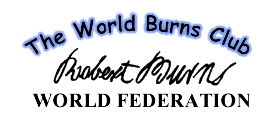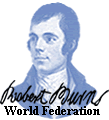


 |
 |
 |
Whisky will be forever linked to the name of Robert Burns. Scotland's greatest poet considered whisky his "muse" and it seems he had a special liking to whisky from the famous Ferintosh distillery. Many whisky books quote the outcry in his poem Scotch Drink when the privilege of distilling free of duty, granted to Duncan Forbes of Culloden in 1689, was withdrawn from Ferintosh in 1785:
Despite him cursing the Excise, only four years later, in 1789, Robert Burns, troubled by financial difficulties, joins the Scottish Excise Service and for the rest of his life he would be a poor, damn'd, rascally Gager.
 Whisky
was far from the only thing that fell under Excise laws in late 18th century
Scotland: duty had to be paid on beer, malt, tea, salt, tobacco, soap, candles,
glass, bricks, cocoa, coffee, cider, leather, paper, spirits, calicoes, wine
and wire. Burns' first Excise station, a large stretch of countryside between
Dumfries and the Lowther Hills, comprised tanners, maltsters, tobacconists,
victuallers (these were publicans brewing their own beer) and wine, spirit
and tea dealers. After a year, he was moved to another Excise station, covering
about a third of Dumfries and its immediate surroundings, where he was responsible
for tobacconists, victuallers, a chandler and a brickmaker. In the spring
of 1792, Burns took up his third and final Excise post, another part of Dumfries.
Here duty had to be collected from a brewery, tanners, chandlers, a maltster,
victuallers, dealers in spirits, wines and tea and all excisable goods passing
through the port.
Whisky
was far from the only thing that fell under Excise laws in late 18th century
Scotland: duty had to be paid on beer, malt, tea, salt, tobacco, soap, candles,
glass, bricks, cocoa, coffee, cider, leather, paper, spirits, calicoes, wine
and wire. Burns' first Excise station, a large stretch of countryside between
Dumfries and the Lowther Hills, comprised tanners, maltsters, tobacconists,
victuallers (these were publicans brewing their own beer) and wine, spirit
and tea dealers. After a year, he was moved to another Excise station, covering
about a third of Dumfries and its immediate surroundings, where he was responsible
for tobacconists, victuallers, a chandler and a brickmaker. In the spring
of 1792, Burns took up his third and final Excise post, another part of Dumfries.
Here duty had to be collected from a brewery, tanners, chandlers, a maltster,
victuallers, dealers in spirits, wines and tea and all excisable goods passing
through the port.
Luckily for Burns, he didn't have to act as the "Deil" against his muse. There was a whisky distillery in Dumfries in 1795 (and possibly earlier), but there is no indication that it ever fell under his responsibility; it may very well have been located outside his Excise stations.
Robert Burns died on July 21 1796, at the age of 37, from endocarditis. Since his teens he had suffered from ill-health, rheumatic fevers and nervous depressions and this, combined with the hard life of an Excise officer (the sheer size of the area covered by his first Excise post forced him to spend long hours on horse back almost daily, in sometimes atrocious weather conditions), almost surely shortened his life. It is ironic that the Excise he first cursed and then joined, appeared instrumental in his death.
Article Contributed
by
Dr Alex.R. Kraaijeveld
NERC Centre for Population Biology
Imperial College
Berks, England
This article was first published as part of the series of "Whisky on the Edge" columns on the www.celticmalts.com web-site.
© 2008 The Robert Burns World Federation
Thee, Ferintosh! O sadly lost!
Scotland lament frae coast to coast!
Now colic grips, an barkin hoast
May kill us a';
For loyal Forbes' charter'd boast
Is taen awa!
Thae curst horse-leeches o th' Excise,
Wha mak the whisky stells their prize!
Haud up thy han', Deil! ance, twice, thrice!
There, seize the blinkers!
